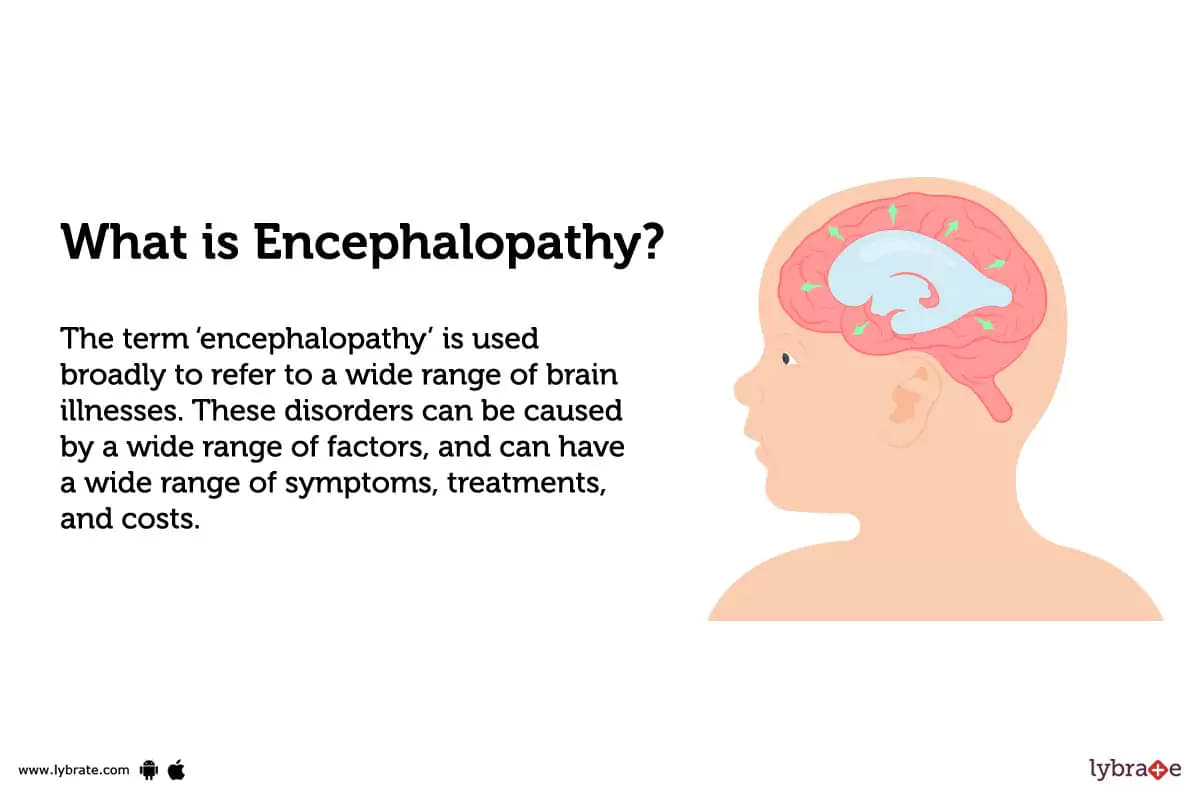Encephalopathy: Causes, Symptoms, Treatment, and Cost
Last Updated: Jul 04, 2023
What is Encephalopathy?
The term 'encephalopathy' is used broadly to refer to a wide range of brain illnesses. These disorders can be caused by a wide range of factors, and can have a wide range of symptoms, treatments, and costs.
What are the types of Encephalopathy
There are many different types of encephalopathy, and all have their unique set of causes and symptoms. Some common types of encephalopathy include:
Metabolic encephalopathy
Metabolic encephalopathy occurs as a result of a problem with the body's metabolism. This type of encephalopathy can be caused by a variety of metabolic disorders such as liver or kidney failure, electrolyte imbalances, or endocrine disorders. Symptoms can include confusion, disorientation, and changes in mood or behavior. Treatment options include addressing the underlying metabolic disorder and providing supportive care.
Toxic encephalopathy
As a result of exposure to poisons such heavy metals or chemicals, toxic encephalopathy develops. This kind of encephalopathy can be brought on by taking certain medications, eating certain foods, or being exposed to environmental contaminants. Symptoms can include confusion, disorientation, and changes in mood or behavior. Treatment options include addressing the underlying exposure to toxins and providing supportive care.
Traumatic encephalopathy
Traumatic encephalopathy occurs as a result of a traumatic injury to the brain, such as a head injury. Symptoms can include confusion, disorientation, memory loss, and changes in mood or behavior. Treatment options include addressing the underlying traumatic injury and providing supportive care. Surgery can be required in some circumstances to get rid of any hematomas or fix any structural problems.
Infectious encephalopathy
Infectious encephalopathy occurs as a result of an infection in the brain, such as meningitis or encephalitis. Symptoms can include fever, headache, confusion, disorientation, and changes in mood or behavior. Antibiotics or antiviral drugs can be used to treat the underlying infection, and supportive care might also be given.
What are the symptoms of Encephalopathy?
What causes Encephalopathy?
Encephalopathy can be caused by a wide range of factors, including:
- Metabolic disorders, such as liver or kidney failure
- Toxins, such as heavy metals or chemicals
- Trauma, such as a head injury
- Infections, such as meningitis or encephalitis
- Nutritional deficiencies, such as thiamine deficiency
Encephalopathy vs. Encephalitis
Encephalopathy and encephalitis are two different conditions, but they can have similar symptoms. Encephalopathy is a general term that refers to any disorder that affects the brain, whereas encephalitis specifically refers to an inflammation of the brain.
What are the Risk Factors of Encephalopathy?
Risk factors for encephalopathy can vary depending on the type of encephalopathy, but some common risk factors include:
- Chronic alcoholism
- Chronic kidney or liver disease
- Exposure to toxins, such as heavy metals or chemicals
- Certain medications, such as anticonvulsants or antibiotics
- Nutritional deficiencies, such as thiamine deficiency
How can you prevent Encephalopathy?
To prevent encephalopathy, it is important to avoid known risk factors. Some tips to reduce the risk of encephalopathy include:
Do
- Get regular check-ups, especially if you have a chronic illness
- Follow a healthy diet
- Avoid being exposed to toxins like chemicals or heavy metals
- Practicing good hygiene to prevent infections
- Eating a healthy diet that includes all the necessary nutrients
Don’t
- Heavy alcohol consumption
- Neglect any symptoms of illness
- Ignore risk factors for encephalopathy
Encephalopathy - Diagnosis and Tests
Encephalopathy can be diagnosed through a variety of tests, such as:
- Physical examination to check for neurological symptoms
- Blood tests to check for metabolic or infectious causes
- Brain imaging, such as CT or MRI scans, to check for structural abnormalities in the brain
- Electroencephalogram (EEG) to check for abnormal brain activity
- Lumbar puncture to check for infections or inflammation in the cerebrospinal fluid
What are the possible complications of Encephalopathy?
Complications of encephalopathy can include:
- Seizures
- Coma
- Death
- Permanent brain damage
Home Remedies for Encephalopathy?
Since encephalopathy is a medical illness that needs to be properly diagnosed and treated, there are no specific home treatments for it. However, some general tips to manage symptoms of encephalopathy include;
- Getting plenty of rest
- Eating a healthy diet
- Practicing good hygiene
- Avoiding stress
What to eat in Encephalopathy?
Encephalopathy symptoms can be controlled with a nutritious diet that contains all the essential elements. Among the foods that might be advantageous are;
- Veggies and fruits, which are abundant in antioxidants
- Whole grains are a good source of B-Vitamins.
- Lean meats, such chicken or fish
- Low-fat dairy products
Encephalopathy Treatments
Treatment options for encephalopathy will depend on the underlying cause. Some common treatment options include;
Medications
Medications such as antibiotics can be used to treat encephalopathy caused by infections. Anticonvulsants can be used to control seizures.
Dialysis
Dialysis can be used to treat encephalopathy caused by metabolic disorders such as kidney failure
Surgery
Surgery may be necessary for traumatic encephalopathy caused by head injuries.
Nutritional supplements
Nutritional supplements can be used to treat encephalopathy caused by nutritional deficiencies. It's important to note that the treatment plan will be tailored to each individual case and will depend on the underlying cause of the encephalopathy.
Consulting with a neurologist or neurosurgeon is recommended for proper diagnosis and treatment.
Which doctor to consult for Encephalopathy?
A neurologist or neurosurgeon should be consulted regarding encephalopathy.
Which are the best medicines for Encephalopathy?
The underlying etiology of the encephalopathy will determine the best treatment options. The ideal treatment strategy for you will be recommended by your doctor.
How long does it take to recover from Encephalopathy?
Depending on the underlying cause and the severity of the ailment, encephalopathy recovery times can vary. Some people might heal more quickly than others.
Are the results of the treatment permanent?
Treatment for encephalopathy may have long-lasting effects depending on the underlying etiology and the severity of the condition. While some individuals may sustain irreversible brain injury, others may make a full recovery.
Who is eligible for the treatment?
Anyone with symptoms of encephalopathy is eligible for treatment.
Who is not eligible for the treatment?
Individuals who do not show symptoms of encephalopathy are not eligible for treatment.
What are the post-treatment guidelines?
Following encephalopathy therapy, it's crucial to;
- Visit your doctor for routine checkups
- Continue taking any prescribed drugs
- Practice a healthy lifestyle, including a healthy diet and regular exercise
What is the price of Encephalopathy treatments in India?
The cost of treatment for encephalopathy in India can vary depending on the underlying cause and the type of treatment required. The standard consultation fee for a neurologist or neurosurgeon can range from Rs. 1,000 to Rs. 1,500. However, the cost of the procedure may range from Rs. 20,000 to Rs. 50,000 and above, depending on the doctor's conclusion and the type of treatment necessary. It's always best to consult a doctor and get a quote for the treatment and also check the insurance coverage.
What are side-effects of Encephalopathy treatments?
Side effects of encephalopathy treatments can vary depending on the type of treatment. Some common side effects include:
- Drowsiness or dizziness from medications
- Nausea or vomiting
- Headache
- Rashes or other allergic reactions
It is important to inform your doctor of any side effects you experience during treatment.
Encephalopathy - Outlook / Prognosis
Depending on the underlying reason and the severity of the disorder, the prognosis for encephalopathy can change. Some people may fully recover with proper treatment, while others may experience permanent brain damage. It is important to seek prompt medical attention for symptoms of encephalopathy to improve the chances of recovery.
References
- Encephalopathy- HealthDirect [Internet]. healthdirect.gov.au 2017 [Cited 27 July 2019]. Available from:
- Encephalopathy Information Page- NIH, National Institute of Neurological Disorders and Stroke [Internet]. ninds.nih.gov 2019 [Cited 26 July 2019]. Available from:
- Kung D, Nguyen T, Das R. Toxic and Metabolic Encephalopathy. InAbsolute Case-Based Neurology Review 2019 (pp. 129-138). Springer, Cham. [Cited 26 July 2019]. Available from:
Table of content
15+ Years of Surgical Experience
All Insurances Accepted
EMI Facility Available at 0% Rate
Find Neurologist near me
Ask a free question
Get FREE multiple opinions from Doctors



